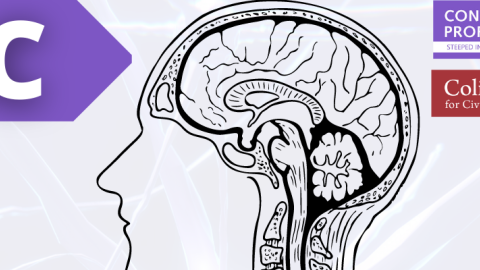CASAC

CASAC
Step Into a Career Ranked #14 Among Best Jobs
CASAC certification prepares you for a meaningful career as a Certified Psychologist Counselor, ranked #14 best job by U.S. News & World Report for 2025.
Become a Certified Psychology Counselor
Every day, countless individuals and families across New York face the challenges of addiction and recovery. Compassionate, well-trained counselors play a critical role in guiding them toward healing, resilience, and long-term success. The demand for credentialed substance abuse counselors continues to rise, creating opportunities for those dedicated to making a difference.
The Credentialed Alcoholism and Substance Abuse Counselor (CASAC) certification is recognized by the New York State Office of Addiction Services and Supports (OASAS) as the professional standard for addiction counseling. At The City College of New York’s Office of Continuing and Professional Studies (CPS)—in partnership with the Colin Powell School for Civic and Global Leadership’s Psychology Department—you can complete the OASAS-approved, CASAC Training Program, fulfilling the educational requirements for the counselor-trainee credential.
Program Overview
This program fulfills the academic requirement for the New York State Credentialed Alcoholism and Substance Abuse Counselor (CASAC) certification. Designed for aspiring counselors and current professionals in social work, psychology, mental health, education, or rehabilitation, the curriculum provides the foundational knowledge and applied skills needed to support individuals and families affected by substance use disorders.
Through ten OASAS-approved Psychology courses, students gain a comprehensive understanding of:
- Psychopharmacological and physiological effects of drugs and alcohol
- Signs, symptoms, and stages of addiction and recovery
- Individual, group, and family counseling techniques
- Ethics, confidentiality, and professional standards in clinical practice
- Family systems and treatment approaches
- Cultural competence and supporting diverse communities
Students must complete at least 50% of the coursework synchronously or in-person.
Who Should Enroll?
This training is ideal for:
- Those seeking a career in substance abuse counseling
- Practicing social workers, psychologists, psychiatrists, or rehabilitation counselors
- Mental health counselors, marriage and family therapists, or school counselors looking to deepen their skills
Why Choose CCNY?
As one of New York’s most respected public institutions, CCNY combines academic excellence with a mission of social impact. You’ll learn from experienced instructors in psychology and counseling who bring real-world expertise to the classroom—helping you gain the knowledge, confidence, and credentials to make a difference in your community.
Prerequisites
- High School Diploma or Equivalent
- At least 18 years old
Tuition
Full Program: $5,000*
Individual Courses: $475 each*
*A $25 non-refundable registration fee is not included in the tuition price.
CASAC Credential Information
Satisfactory completion of 350-hours of education/training, supervised practical training, and documented work experience as well as passing the New York State Office of Alcoholism and Substance Abuse Services (NYS-OASAS) written examination are required for the Credentialed Alcoholism and Substance Abuse Counselor (CASAC) designation.
For complete information on the CASAC credentialing process in NYS, please go to: https://on.ny.gov/3nIyWHb.
Program Curriculum
The CASAC Training Program consists of ten OASAS-approved courses that provide a comprehensive foundation in addiction counseling theory and practice. Each course builds on the last, helping you develop the knowledge, skills, and ethical framework needed to work effectively in the field of substance abuse counseling.
It is recommended that students begin with Introduction to Lifespan Development (PSY 226) or Infancy and Childhood (PSY 246) to gain an essential understanding of human growth and development. After completing one of these introductory psychology courses, students should continue through the remaining CASAC courses in ascending order to ensure a smooth and logical learning progression.
This structured sequence prepares you to meet the educational requirements for the New York State Credentialed Alcoholism and Substance Abuse Counselor (CASAC) credential and equips you with the practical and theoretical background for a rewarding career helping individuals and communities overcome addiction.
PSY 226- Introduction to Lifespan Development
Introduces theories, concepts and research which enrich our understanding of human development throughout the life cycle. Students may wish to take this course as a general introduction to human development before enrolling in courses which focus on particular developmental periods
PSY 246- Infancy & Childhood
Topics include genetic considerations; prenatal development; the characteristics of the neonate; cognitive processes; language development; personality changes; early socialization; moral development
PSY 254- Mind, Brain and Experience
How does activity in the nervous system give rise to perception, memory, and attention? Is everything psychological simultaneously biological? This course is an introduction to neuroscience, exploring the neural basis of the human mind. Topics include neural communication, sensory systems, working memory, attention, and consciousness. Case studies will be presented of patients with various forms of brain damage, including aphasia, blindsight, and prosopagnosia.
PSY 340- Substance use Disorders: Diagnosis and Treatment
This course explores theory and research on the neurobiological, genetic, developmental, and personality factors contributing to the misuse of alcohol, tobacco, and other substances. The course provides a general overview and introduction to the psychopharmacology of misused substances and prescription drugs commonly used in treating Substance Use Disorder.
PSY 350- Treatment of Substance Use Disorders
The aim of this course is to introduce students to concepts relevant to the evaluation, treatment planning, referral and coordination of Substance Use Disorder services. A range of evidence-based methods will be discussed. Students will gain knowledge of the diagnostic criteria for alcohol and substance use disorders utilizing the current version of the Diagnostic and Statistical Manual.
PSY 360- Case Management of Substance Use Disorders
The aim of this course is to examine treatment planning and case management of Substance Use Disorders, including assessment, planning, linking, monitoring, and advocacy. Students will learn how to build a therapeutic alliance, systematically gather data from clients and collateral sources, determine treatment readiness, and develop a treatment plan consistent with their clients’ goals. Emphasis will be placed on client record keeping and documentation of service coordination activities throughout the continuum of care.
PSY 363- Psych of Prevention Sciences
This course examines the history and societal tensions between mental health promotion and mental illness treatment. We study the skills necessary to promote mental health and reduce risks for mental illness through community-based interventions, while learning the specific vocabulary of prevention research.
PSY 365- Family Psychology
Family structure and process in terms of historical, cultural and psychosocial factors. Emphasis on viewing family interactions in terms of a psychodynamic system and subsystems. The complex relationships within the family and between the family and society serve as a setting for theorizing, researching and developing models of constructive intervention.
PSY 367- Small Group Processes
The course is divided into two parts: self-study groups and lectures. The self-study group examines its own behavior in order to help the student develop an ability to observe, analyze and understand the small group as a social system. The lectures present concepts, case materials, and empirical findings on group phenomena.
PSY 370- Counseling Issues in the Treatment
This course provides an overview of treatment issues specific to the counseling of Substance Use Disorders with an emphasis on developing foundational counseling skills to individuals and groups, including recognizing and responding to verbal and non-verbal behaviors, enhancing client engagement, and maintaining nonjudgmental attitudes.
PSY 380- Intro to Clinical and Counseling Psychology
The aim of this course is to introduce basic concepts relevant to the application of clinical and counseling psychology, including pertinent ethical codes and considerations, provision of culturally competent interventions, and the centrality of the counselor and client relationship. Students will learn basic counseling and communication skills through lectures, small group discussions, and role-plays. Issues of multiculturalism and diversity will be presented and developed throughout the course via readings, discussions and student writing assignments. The course will familiarize students with theoretical and practical tenets of counselor and client interactions, ethical responsibilities, interpersonal dynamics and dilemmas, and clinical supervision.
Spring 2026 Registration is Now Open.
For information regarding the above program, please contact the CASAC coordinator at casac@ccny.cuny.edu and cpshealth@ccny.cuny.edu
Career Outlook at a Glance
job growth in one of the fastest-expanding fields in mental health and social services.
average salary with strong potential for career advancement.
openings every year showing nationwide demand for trained counselors.
jobs in 2024 reflecting a growing, community-focused workforce.
Last Updated: 11/13/2025 10:00
